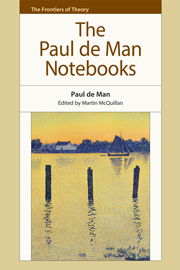Book contents
- Frontmatter
- Contents
- Series Editor's Preface
- Acknowledgements
- Dedication
- Introduction: ‘The Unimaginable Touch of Time’: The Public and Private in the Notebooks of Paul de Man
- PART I Texts
- PART II Translations
- PART III Teaching
- 17 Field of Comparative Literature: Analysis of Needs (1967)
- 18 The Comparative Literature Program at Rutgers University: A Report
- 19 Comparative Literature 816a: Hegel and English Romanticism
- 20 Comparative Literature 816a: Hegel and English Romanticism
- 21 Comparative Literature 817a: Aesthetic Theory from Kant to Hegel
- 22 Curriculum for Lit Z Proposal (1975)
- 23 Literature Z: Exercise II
- 24 Rhetorical Readings
- 25 Director's Report on Rhetorical Reading (1982)
- 26 Seminar on “Aesthetic Theory from Kant to Hegel”. Fall Semester, 1982
- PART IV Research
- Appendix. The Notebooks of Paul de Man 1963–83
- Bibliography
- Index of Names
22 - Curriculum for Lit Z Proposal (1975)
from PART III - Teaching
Published online by Cambridge University Press: 05 December 2014
- Frontmatter
- Contents
- Series Editor's Preface
- Acknowledgements
- Dedication
- Introduction: ‘The Unimaginable Touch of Time’: The Public and Private in the Notebooks of Paul de Man
- PART I Texts
- PART II Translations
- PART III Teaching
- 17 Field of Comparative Literature: Analysis of Needs (1967)
- 18 The Comparative Literature Program at Rutgers University: A Report
- 19 Comparative Literature 816a: Hegel and English Romanticism
- 20 Comparative Literature 816a: Hegel and English Romanticism
- 21 Comparative Literature 817a: Aesthetic Theory from Kant to Hegel
- 22 Curriculum for Lit Z Proposal (1975)
- 23 Literature Z: Exercise II
- 24 Rhetorical Readings
- 25 Director's Report on Rhetorical Reading (1982)
- 26 Seminar on “Aesthetic Theory from Kant to Hegel”. Fall Semester, 1982
- PART IV Research
- Appendix. The Notebooks of Paul de Man 1963–83
- Bibliography
- Index of Names
Summary
This document is for internal use only. It is not written for presentation to a foundation but as a preliminary position paper for discussion toward such a presentation.
The curriculum for the teaching of literature, at Yale and elsewhere, has undergone very little change over the last two or three decades. The main organization of the program remains the same: a sharp distinction, without overlap, into national literatures and, within each national literature, a tripartite division into (1) introductory survey courses (English 25 and 29, French 41, Literature I, etc.), (2) a sequence of period courses diachronically ordered, and (3) more advanced courses reflecting the particular interests of available instructors. The underlying conception is genetic, seeing literature as a succession of periods and movements that can be articulated as an historical narrative. With regard to individual works, the conception is essentially paraphrastic and thematic, the assumption being that literature can be reduced to a set of statements which, taken together, lead to a better understanding of human existence. Literary studies then become, on the one hand, a branch of the history of culture and, on the other hand, a branch of existential and anthropological philosophy in its individual as well as its more collective aspects.
While remaining highly useful and entirely legitimate, this program does not sufficiently reflect the concerns of literary studies as they have developed, here and abroad, over the last fifty years. The emphasis has increasingly moved toward literature as a language about language, or a metalinguistic discipline best understood as a response to the specific complexities and resources of language.
- Type
- Chapter
- Information
- The Paul de Man Notebooks , pp. 247 - 250Publisher: Edinburgh University PressPrint publication year: 2014



